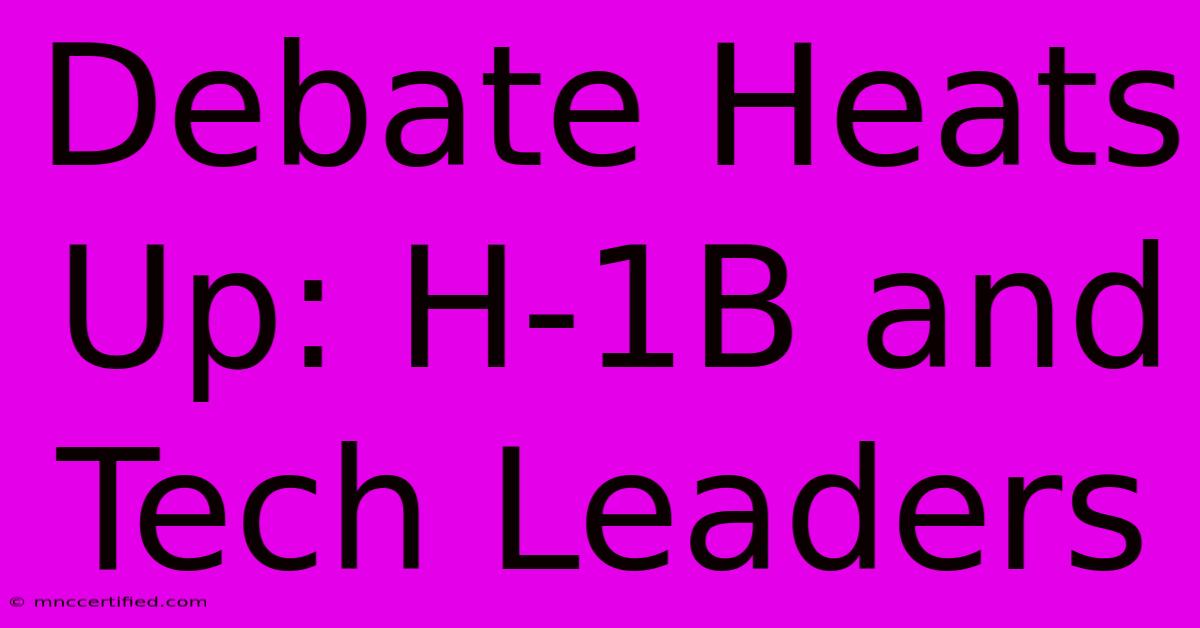Debate Heats Up: H-1B And Tech Leaders

Table of Contents
Debate Heats Up: H-1B Visas and the Future of Tech Leadership
The H-1B visa program, designed to bring in foreign workers with specialized skills, is once again at the center of a heated debate. While tech giants champion it as crucial for innovation, critics raise concerns about its impact on American workers and potential exploitation of foreign talent. This article delves into the complexities of the H-1B debate, examining its pros and cons and exploring potential solutions for a more equitable and effective system.
The H-1B Visa Program: A Necessary Evil or a Broken System?
The H-1B visa program allows U.S. employers to temporarily employ foreign workers in specialty occupations that require theoretical or practical application of a body of specialized knowledge. These occupations are predominantly found in the tech industry, encompassing roles like software engineers, data scientists, and AI specialists. Proponents argue that the program is essential for filling critical skill gaps, fostering innovation, and maintaining America's competitive edge in the global technology market. Tech leaders frequently cite the program's necessity for accessing a global talent pool and driving economic growth. They contend that restricting access to skilled foreign workers would stifle innovation and hinder the development of cutting-edge technologies.
However, the program is not without its detractors. Critics argue that it can depress wages for American workers, particularly in the tech sector, and that it allows companies to prioritize cheaper labor over domestic talent. Furthermore, concerns exist regarding potential abuses of the system, including the exploitation of foreign workers through low wages and poor working conditions. The debate is further complicated by accusations of companies using the H-1B program to displace American workers rather than supplement the workforce.
Key Arguments For and Against H-1B Visas
Arguments in favor often highlight:
- Addressing Skill Shortages: The claim that the U.S. lacks enough domestically trained professionals to meet the demands of the tech industry.
- Economic Growth: The contribution of H-1B visa holders to the U.S. economy through innovation and job creation.
- Global Competitiveness: Maintaining a competitive edge in the global tech landscape by attracting top talent from around the world.
Arguments against frequently center on:
- Wage Suppression: The potential for H-1B visas to depress wages for American workers, particularly in specialized fields.
- Exploitation of Workers: Concerns about the potential for abuse and exploitation of foreign workers.
- Impact on American Workers: The fear that the program displaces American workers rather than supplementing the workforce.
Finding a Balance: Potential Solutions and Future Directions
The ongoing debate necessitates a balanced approach. Reform efforts should aim to address the concerns of both proponents and critics, ensuring that the H-1B program serves its intended purpose while mitigating its potential negative consequences. Potential solutions include:
- Increased Transparency and Accountability: Stricter enforcement of existing regulations to prevent exploitation and ensure fair wages.
- Prioritizing High-Skill Workers: Focusing on attracting and retaining individuals with advanced degrees and exceptional skills.
- Investing in STEM Education: Addressing the root cause of skill shortages by improving STEM education and training programs in the United States.
- A More Merit-Based System: A system that prioritizes applicants based on skills and qualifications, rather than simply filling employer quotas.
- Strengthening Employer Responsibilities: Holding employers accountable for fair treatment of H-1B visa holders.
Conclusion: The Need for a Comprehensive Approach
The H-1B visa debate is far from over. Finding a sustainable solution requires a multi-faceted approach that considers the needs of the tech industry, American workers, and foreign talent. A reform that balances innovation and economic growth with fair labor practices and the protection of American workers is crucial for the future of the tech sector and the U.S. economy. The future of tech leadership hinges on finding a solution that fosters innovation without compromising ethical considerations and fair labor practices. Open dialogue and collaborative efforts are necessary to navigate this complex issue and create a more equitable and effective immigration system.
Keywords: H-1B visa, tech leaders, immigration, tech industry, skilled workers, innovation, economic growth, wage suppression, exploitation, STEM education, reform, immigration reform, American workers, foreign workers, global competitiveness, high-skill workers, merit-based system.

Thank you for visiting our website wich cover about Debate Heats Up: H-1B And Tech Leaders. We hope the information provided has been useful to you. Feel free to contact us if you have any questions or need further assistance. See you next time and dont miss to bookmark.
Featured Posts
-
Rapper Og Maco Dead At 32
Dec 28, 2024
-
Sean Hannity Ainsley Earhardt Engaged
Dec 28, 2024
-
Californias 1 22 Billion Mega Millions Winner
Dec 28, 2024
-
Vasile Nicolae Barnard Castle Business
Dec 28, 2024
-
Cowboys Lamb Season Ending Injury
Dec 28, 2024